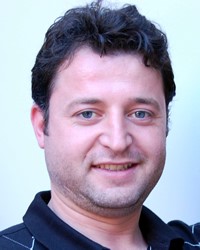Turk in Canada

Photo Source:
Anonymous
|
Send Joshua Project a map of this people group.
|
| People Name: | Turk |
| Country: | Canada |
| 10/40 Window: | No |
| Population: | 68,000 |
| World Population: | 66,822,900 |
| Primary Language: | Turkish |
| Primary Religion: | Islam |
| Christian Adherents: | 1.00 % |
| Evangelicals: | 0.40 % |
| Scripture: | Complete Bible |
| Ministry Resources: | Yes |
| Jesus Film: | Yes |
| Audio Recordings: | Yes |
| People Cluster: | Turkish |
| Affinity Bloc: | Turkic Peoples |
| Progress Level: |
|
Introduction / History
Turkey is considered to be a "link" between the Orient (Chinese and Mongol peoples) and the Occidental (Anglo-Saxons, Slavs, Goths, and Latins – what we know as the West). The Turks, therefore, have a knowledge of both Eastern and Western cultures, and the two mix in their own ways of life. Turkey is a nation that came out of the Ottoman Empire that lasted 600 years. Turks are proud of their history and their culture that many consider to be more advanced than that of the Arab empires. Still, many Turks have moved outside of Turkey to earn a better living.
The majority of Turks live in their home country, but significant numbers live elsewhere. Several million Turks live in Germany alone, as either guest workers or German citizens. Many more live throughout Europe and North America. In Canada, the majority of Turks have migrated to Toronto and Montreal, though Turkish communities have sprung up in other large cities as well, and growth continues.
The first Turkish immigrants to Canada are recorded in the 1800s, and today a great many Canadians can claim either full or partial Turkish ancestry. From 1945 to 1960, the Turkish government supported a program of education abroad which boosted immigration and travel. The Turkish-Canadian community is still influenced to this day by engineers and doctors trained during that era. Turks are most likely to live in Ontario or Quebec.
What Are Their Lives Like?
Many younger Turks want to remain Turkish like their parent's generation, but they have a constant pull of Canadian ways. Islam is still part of their identity, but their daily lives become more secular the longer they live outside of Muslim Turkey. The younger Turkish generation in Canada is developing their own dialect of Turkish that has many English loan words.
Outside of educational and economic opportunities, some Turks have migrated to escape political unrest during troubled times. No matter what changes Turkish migrants experience, they will always practice hospitality. They have their own networks for social and community needs, employment and marriage opportunities. There are at least 17 Turkish associations in Canada.
Though the Turks change their country of residence, they bring with them much of their culture including Islamic worship at a mosque and celebration of Muslim festivals. Those who are religious and those who are secular are both committed to one degree or another to Islam as a religious system. Mosques are becoming a more common sight in Canadian cities, providing services as educational and social centers as well as a place for Islamic religious practices
What Are Their Beliefs?
Turkish people in Canada are nominally Muslim. They need to see past their inherited religious customs, and their empty life pursuits of enjoyment and fulfillment. They need to see the emptiness of alcohol, drugs and immoral sexual relationships, and have their hearts touched so that they will begin to long for something more.
What Are Their Needs?
Turks in Canada need to see and experience the true holiness that comes from a relationship with Jesus Christ.
Prayer Points
Pray that churches and mission organizations will accept the challenge of adopting and reaching the Turks until they have a movement to Christ in Canada and beyond. Ask God to give Turkish believers boldness to share the hope of Christ with their own people. Ask the Lord to save key leaders among Turks in Canada who can open the door for others to experience salvation in Christ. Pray that Christ followers in Canada will build solid community with their Turkish neighbors, opening their homes in hospitality, and sharing the love of the God who washes feet and invites all to come in and dine with him.